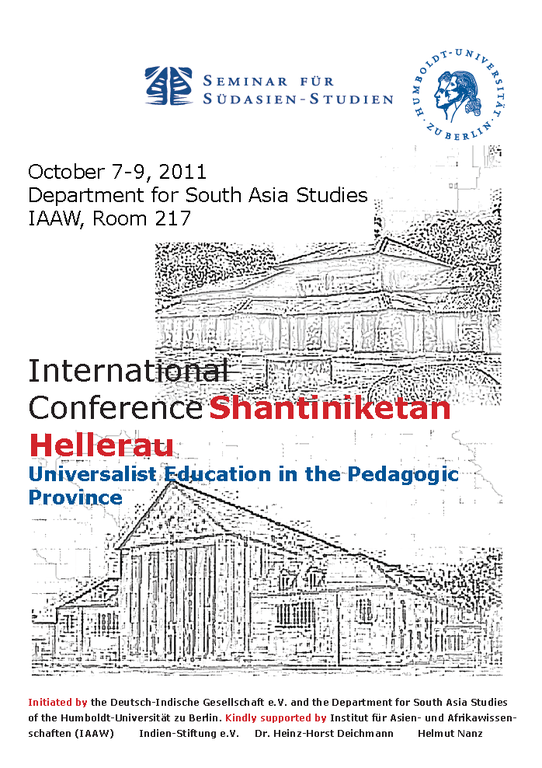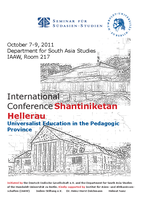When
Oct. 7th 2011, 11 am until
Oct. 9th 2011, 1 pm
Where
Department for South Asia Studies, IAAW, Room 217
Programme
Opening
Friday, Oct. 7
11 am-12.30 pm
President of the Humboldt-Universität
Prof. Dr. Jan-Hendrik Olbertz
Representatives of the Embassies of India and Bangladesh
His Excellency the Ambassador of India to Germany Mr. Sudhir Vyas
His Excellency the Ambassador of Bangladesh to Germany Mr. Mosud Mannan
Introduction
Prof. Dr. Michael Mann, Humboldt-Universität Berlin "Lebensreform" and Education Reform at the Turn of the 19th Century
Reception
2 pm-6.30 pm
Panel I: Universalistic and Holistic Education at Shantiniketan
Udaya Narayana Singh (Santiniketan, India)
Liberty, Freedom and Responsibility.The Ultimate Objectives of Tagore’s Experiments with Education
Arabella Unger (Universität Tübingen, Germany)
Education for a Complete Life
Tea/Coffee break
Christine Kupfer (Universität Heidelberg, Germany)
Unworldly or All-Worldly? Tagore’s Educational Philosophy at Shantiniketan
Ursula Bickelmann-Aldinger (Heidelberg) East and West: Rabīndranāth Tagore‘s Utopia of a Holistic Education Towards a Universal View of the World versus a Creative Approach
Aishika Chakraborty (Brahmananda Keshab Chandra College, Kolkata) Towards a Future of Performance: Tagore and his New Dance
Saturday, Oct. 8
9 am-1 pm
Panel II: New Education and the Rurality of the Place
Deepak Kumar (Jawaharlal Nehru University, Delhi, India)
Tagore’s Pedagogy and Rural Reconstruction
Fakrul Alam (Dhaka University, Bangladesh) Tagore, Thoreau and Life-Centered Educationist amidst Nature
Tea/Coffee Break
Uma Das Gupta (Kolkata, India) Nature, Education, Culture: The Santiniketan School Experiment
Asit Datta (Leibnitz Universität Hannover, Germany)
Tagore, the New Educationalist
14.30-19.30 Uhr 2.30-7.30 pm
Panel III: Educational and Pedagogic Reform at Hellerau
Michael Mann (Humboldt-Universität zu Berlin):
"Lebensreform" at Hellerau
Thomas Nitschke (Leipzig):
Die Gartenstadt Hellerau als pädagogische Provinz
Tea/Coffee Break
Christine Straumer (Musikhochschule Dresden)
Hellerau und Emile Jaques-Dalcroze – Von der pädagogischen Idee zum Gesamtkunstwerk
Boris Friedewald (Berlin) Das Bauhaus, Hellerau und Santiniketan
8.00 pm
Dinner
Sunday, Oct. 9
9.00 am-1.00 pm
Panel IV: Beyond Hellerau and Shantiniketan
Joachim Oesterheld Tagore, Geheeb and Others. Indo-German Encounters in New Education during the First Half of the Twentieth Century
Maria Moritz (Humboldt-Universität zu Berlin, Germany)
A "Universal Brotherhood of Humanity" Through Education?
Rudolf Steiner’s Reform Pedagogy and the Global Theosophical Milieu
Tea/Coffee Break
Simone Holtzwart (Humboldt-Universität zu Berlin, Germany) Gandhi’s Vision of „Rural National Education through Village Handicrafts“: The Basic Education Movement and the Experiments in Sevagram/Wardha 1938-1955
Harald Fischer-Tiné (Eidgenössische Technische Hochschule Zürich, Schweiz) Creating „Giants in Body and Mind“: Physical and Intellectual Education in the Gurukul Kangri (1902-1947)
Gallery








